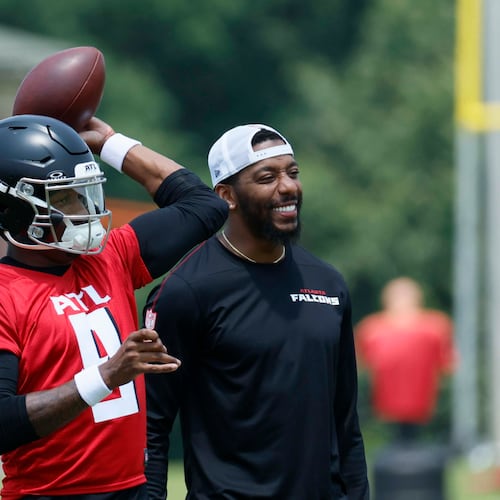NFL teams are better at hoarding information than the CIA. Even those of us with game credentials and media access during the week aren’t privy to what happens when the doors are closed, which is most of the time, making what I’m about to say nothing more than speculation. But here goes:
The Falcons’ defense was different after halftime Sunday. It attacked the Packers, as opposed to the 30 minutes of backpedaling that constituted the first half. Green Bay scored on four of its five first-half possessions; it scored one time in four hereafter. It averaged 7.1 yards per play in the first half, 3.9 in the second. If the Falcons didn’t wad up the defensive game plan and deposit it in the circular file at the break, it’s safe to say they didn’t FedEx it to Canton, Ohio, for future generations to study.
My guess – just a guess, mind you — is that Dan Quinn had something (if not everything) to do with those apparent alterations. Protocol holds that a head coach never says, “Yeah, I changed everything on the fly,” because a head coach considers it his mission to protect his staff. That said, the head coach does have final say. Quinn became a head coach because he was a great defensive coordinator.
Bob McGinn of the Milwaukee Journal-Sentinel opined last week that Quinn was erring in not calling defensive signals during games, the way head coach Mike Zimmer has done with Minnesota to spectacular effect. That resonated with yours truly, given that I once suggested that Mike Smith should take the defense from Mike Nolan to try and save a season going wrong. (Smitty didn't and got fired. He'll coordinate Tampa Bay's defense against the Falcons on Thursday night.)
Richard Smith, no relation to Mike, is the Falcons’ defensive coordinator. He has been around. He was the titular defensive coordinator for Nick Saban with the Dolphins in 2005, though Will Muschamp called plays. That winter, Smith left for the Texans and Muschamp for Auburn after Saban hired Dom Capers as “special assistant” – a title soon amended to “defensive coordinator.” As noted by McGinn, here’s where Smith-coordinated defenses have ranked in yardage: 18th, 24th, 24th, 22nd, 16th and, counting the first half of this season, 26th.
Here’s where the 2013 and 2014 Seattle defenses overseen by Quinn ranked: First and first. We stipulate that the Seahawks’ 2012 defense, as coordinated by Gus Bradley, ranked No. 4 in yards against; with Quinn gone to Flowery Branch, the Seattle defense ranked No. 2 last season and is No. 6 now. If it wasn’t all DQ — and it wasn’t; the Seahawks had and have great players — that defense was nonetheless at its ravenous best under him.
This means the best defensive coordinator employed by the Falcons is technically not coordinating the Falcons’ defense, though said defense is clearly of Quinn’s design. With Vic Beasley Jr. making an imprint and the rookies Keanu Neal, Deion Jones and De’Vondre Campbell assuming major roles, there’s more talent here than when Quinn arrived. But in Year 2, this defense has gotten statistically worse against admittedly tougher sledding. Should that be happening?
In that first half against Green Bay, Aaron Rodgers did as he pleased. Come the second half, the Falcons started slanting their pass rush, forcing him to scramble the way they wanted him to go. (In the first half, he’d been free to choose.) Adrian Clayborn ended consecutive possessions with sacks. Beasley was deployed as the one linebacker in a 4-1-6 alignment and assigned to “spy” on the quarterback. The Falcons disguised coverages and, on the Packers’ final two snaps, appeared to confuse Rodgers.
This could just be me getting all fanciful, but the second half bore the look of a Quinn defense – fast and fearless, gung-ho to the gills. The head coach might have done nothing more at halftime than scarf down an energy bar, but something changed. If a coaching intervention did occur, it worked. If it didn’t, it probably should have.
With every victory, the stakes get higher. With a bit more help from the defense, the team with the raging offense could be something to behold. I understand that Quinn is a head coach and head coaches are supposed to delegate, but if he’s the guy best equipped to run a defense on game days/nights … well, shouldn’t he?
(This assumes he isn’t already, which I don’t think he is. But with an NFL team, you never know.)
About the Author
Keep Reading
The Latest
Featured


